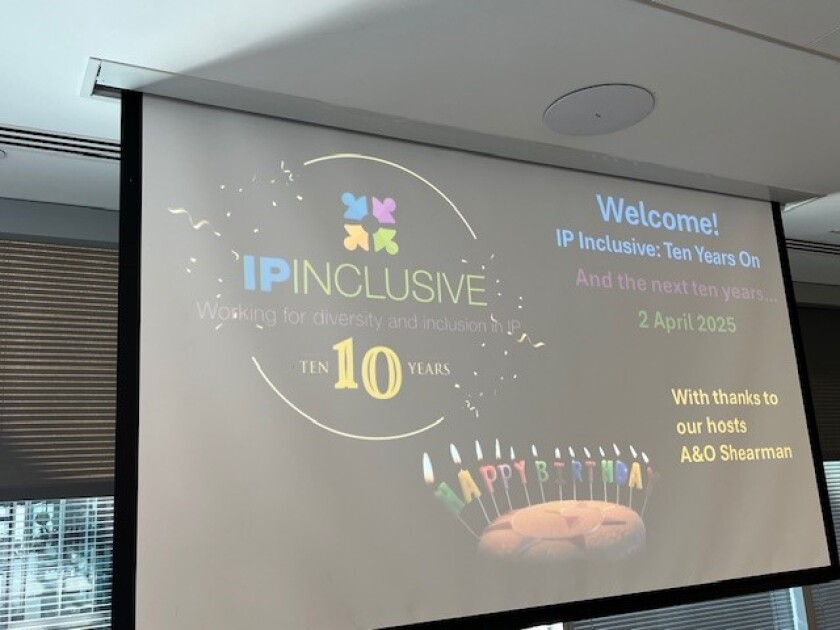“We’ve faced attacks and come out stronger in the past, and we will again.”
This was one of the key messages from an annual meeting of intellectual property professionals committed to boosting and supporting diversity in the sector.
UK-based IP Inclusive hosted its annual meeting yesterday, April 2, at the London office of A&O Shearman.
The event had a special significance, as this year also marks the organisation’s 10th anniversary.
I was honoured to be asked to chair a panel session on the topic of ‘Why do diversity and inclusion still matter?’.
Over the years, I’ve collaborated with IP Inclusive on many topics, such as ethnic diversity and representation of women within the profession, so it was a privilege to be part of the 10-year celebrations.
In a strange way, however, it was fortuitous that this meeting coincided with some of the most troubling and far-reaching attacks on diversity, equity, and inclusion (DEI) that we have seen in many years.
Not because these attacks are a good thing, of course, but because they provided a chance for an open and frank discussion on both the benefits of DEI and where it sits within business and life.
Under fire
The legal sector has been thrown into chaos by executive orders from US President Donald Trump demanding an end to DEI programmes in both the public and private sectors.
Some law firms, such as Paul Weiss and Skadden, had already fallen into line and abandoned their DEI schemes. Hours before yesterday’s meeting, another firm, Willkie Farr & Gallagher, also agreed to a deal with the president.
Those are, of course, US-headquartered firms (though each with a London presence), but the impact of this campaign, and the potential ripple effect in the UK and beyond, were felt among panellists and the audience alike.
To give all panellists the best chance to speak openly and without fear of reprisals, the meeting was held under the Chatham House Rule – which allows attendees (and journalists like me) to use information from a discussion but without attributing it to the speaker or organisation they represent.
One panellist shared that there is an undeniably anxious and disheartened mood around DEI within many law firms, along with a fear that many years of progress could be at risk of being undone.
Law firms, they suggested, are in a bind.
There is a sense that many firms that have so far remained silent are waiting for a large group of others to lead a pushback against the president’s orders before joining them.
The problem is, bar a select two or three firms, no one is taking that leap.
Silence does not equal complicity, was the message, but employees may not see it that way.
Despite the disheartening mood, what ultimately shone through was the resolve of those in attendance that DEI remains not just a force for good but a business necessity.
Other panellists – one of whom works for an organisation which has committed to abandoning DEI initiatives – said that internally, there is still a belief in DEI and the good it can do.
What may change, they shared, is the messaging around DEI. “We may not be able to call it DEI, but we can still work toward the same goals,” they said.
Positive outlook
April 2 was also World Autism Day and provided a chance for IP Inclusive to highlight the work of its IP ability committee, which helps IP professionals and employers become more disability confident.
Another of the panellists in the session I chaired shared their experience of how neurodiversity-based hiring is not just the right thing for businesses but also a smart thing.
They noted that some neurodivergent traits, such as a keen focus, a good memory, and loyalty, can be an asset to organisations.
This was one of countless examples of how strong DEI policies have helped businesses.
The most encouraging thing for me was the continued sense of positivity and strength in the face of adversity.
Panellists and audience members shared their own experiences of why a positive outlook on DEI is so important, not just for their professional lives but in their personal lives too.
Earlier in the meeting, some of the responses to IP Inclusive’s Impact Survey, which collates information on the value and impact of IP Inclusive’s work, were also shared with attendees.
Comments such as “it has opened my eyes”, it has “allowed difficult conversations to happen”, and it has “given me confidence” reaffirmed that the great work around DEI is not in vain.
This may be a time of attack, but there remain reasons to be hopeful. Here’s to the next 10 years!











